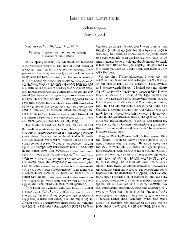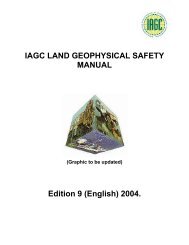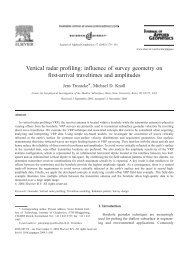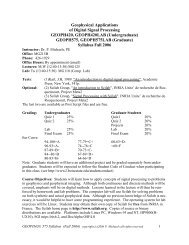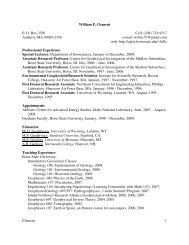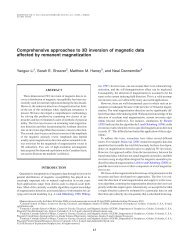Chapter 9 - Instructional Media: Chalkboards to Video - CGISS
Chapter 9 - Instructional Media: Chalkboards to Video - CGISS
Chapter 9 - Instructional Media: Chalkboards to Video - CGISS
You also want an ePaper? Increase the reach of your titles
YUMPU automatically turns print PDFs into web optimized ePapers that Google loves.
Analysis<br />
Synthesis<br />
Evaluation<br />
Identify, analyze, explain, arrange,<br />
discriminate<br />
Integrate, modify, rearrange, plan, create,<br />
design, compose<br />
Decide, rank, convince, judge, summarize,<br />
evaluate<br />
This is a modest list; you can certainly find other verbs that may<br />
better describe what you want your students <strong>to</strong> accomplish in your<br />
discipline.<br />
Example – If you are teaching Theater and are in the<br />
process of producing a play, you might think your students are on<br />
the “application” level when you ask them <strong>to</strong> perform a particular<br />
role in that play. But, because they may be integrating their<br />
experience from previously performed roles, they would actually be<br />
on the “synthesis” level.<br />
When developing learning objectives, consider:<br />
• Good learning objectives are neither so narrowly stated that<br />
they represent the intended curriculum mechanically, nor so<br />
generally stated that they give little clarity <strong>to</strong> the intended goals.<br />
• Objectives should not discourage creativity on the part of either<br />
instruc<strong>to</strong>r or learner, nor should they take away the need for<br />
the instruc<strong>to</strong>r <strong>to</strong> communicate the “challenge” of studying and<br />
learning <strong>to</strong> students.<br />
• Other dangers <strong>to</strong> be aware of are objectives that insult<br />
students’ intelligence, that are restricted <strong>to</strong> lower-level cognitive<br />
skills, or that result in over concentration on small details of the<br />
content that cause students <strong>to</strong> miss the “big picture.”<br />
• Ambiguous objectives -- such as “The students will understand<br />
what makes good theater”-- are not especially useful. Referring<br />
<strong>to</strong> a specific behavior or ability that the instruc<strong>to</strong>r wants the<br />
students <strong>to</strong> gain as a result of the instruction would be more<br />
useful.<br />
Examples<br />
• Theater students will list Smith’s five criteria for the evaluation<br />
of a play and give a rationale for each. (lower-level objective --<br />
knowledge)<br />
• Theater students will apply Smith’s five criteria <strong>to</strong> the<br />
evaluation of a play and present a rational for their evaluations.<br />
(higher-level objective -- evaluation)<br />
Section: Course Planning – Content 14 <strong>Chapter</strong> 2: Determining Learning Objectives



